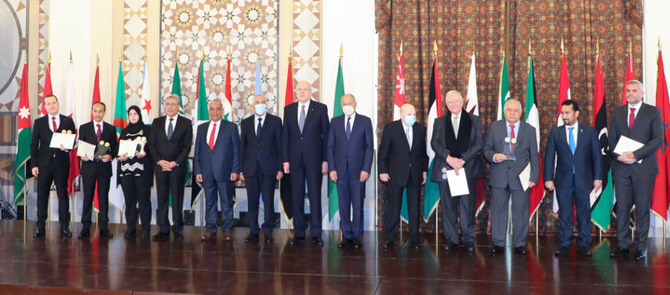
By Najia Houssari — arabnews.com — BEIRUT: Arab League Secretary-General Ahmed Aboul Gheit has praised Lebanon as “a beacon of knowledge that spares no effort in backing every activity that enriches joint Arab action.” Aboul Gheit was speaking on Saturday at a ceremony held by the Council of Arab Justice Ministers in Beirut for Arab doctoral thesis award winners in the field of law and justice. His remarks came after comments by Lebanon Prime Minister Najib Mikati, who said at the ceremony: “We expect our Arab brothers to understand our reality and stand by us to spare Lebanon more risks and help us bear the burdens that have exceeded our capabilities. “Lebanon, which was and will remain part of the Arab world, is experiencing an unprecedented crisis, and our government is trying to solve it with all available capabilities, relying on the support of its Arab brothers and international friends,” Mikati added. “It is unfair to burden Lebanon with more than it can handle,” the prime minister said. Mikati added: “We are unable to stand in a trench here or on a front line there. We have thus adopted a neutrality policy when it comes to Arab conflicts, and we insist on implementing it.” He said that the only loser in any regional dispute “is our Arab world, which has always been seeking unity.”
The prime minister added that Lebanon’s “bitter experience has taught it that fighting leads nowhere and everyone comes out a loser.” He said: “The homeland loses and the people lose. Whoever thinks they can win against their Arab partner is wrong. “Victory can only be achieved through understanding, looking after future generations, and charting a future that fulfills their ambitions.” Aboul Gheit added during his speech that Arab universities are still experiencing “low rankings worldwide due to their lack of innovation and seriousness in scientific research, and the dwindling volume of scientific publications.” He highlighted the need to “recover from this shortfall by increasing the budget for scientific research, providing opportunities for the youth, preparing them to face modern challenges and allowing them access to equal opportunities to compete with other societies.”
The awards were first proposed during the 35th session of the Council of Arab Ministers of Justice in 2019, and were promoted by the council’s Arab Center for Legal and Judicial Research to support scientific research, targeting a category of Ph.D. holders in law and justice. Jury representative and former Lebanese justice minister Ibrahim Najjar said: “It was not easy to choose the best thesis out of hundreds that tackled various topics from all over the Arab world. This diversity shows that we can be open to different cultures and adapt to how the world is constantly developing.”
Lebanese Justice Minister Henry Khoury said that the awards, which will take place every two years, aim to “encourage applied comparative studies that deal with real issues in Arab law and justice, direct studies toward serving national needs in these fields, as well as strengthen legal and judicial studies, and raise institutional awareness in this regard.” Algerian Justice Minister Abdul Rashid Tabbi, who was present at the ceremony, said: “The interest researchers from various universities in the Arab world expressed in the award is the beginning of an Arab scientific rapprochement between the peoples of the Arab world, and it will pave the way for other such opportunities.” The ceremony awarded first prize to Amina Kab, second to Mohammed Mohammed Hussein and third to Safiyan Abdali. Khoury and Tabbi signed two agreements on the sidelines of the event. The first covers judicial cooperation between Lebanon and Algeria on penal policies, while the second aims to prosecute convicts and extradite detainees between the two countries. Tabbi said that the agreements “are the best mechanism for confronting the evasion of criminal accountability, and by signing them, we will establish for both our countries a comprehensive framework that will protect them from criminal threats.”
Meanwhile, an Iranian delegation, led by Culture and Guidance Minister Mahdi Ismaili, arrived in Beirut to inaugurate “Days of Cultural Dawn” activities in Lebanon. The activities are scheduled to be held at the Hezbollah-affiliated Resalat Theater in south Beirut, at the UNESCO Palace in the capital and at the International Center for Dialogue of Civilizations in Rabweh. They include a musical evening by the Rudaki National Iranian Orchestra, a craft exhibition, a symposium on cultural pluralism, a film screening, and poetry and folklore evenings.